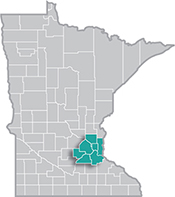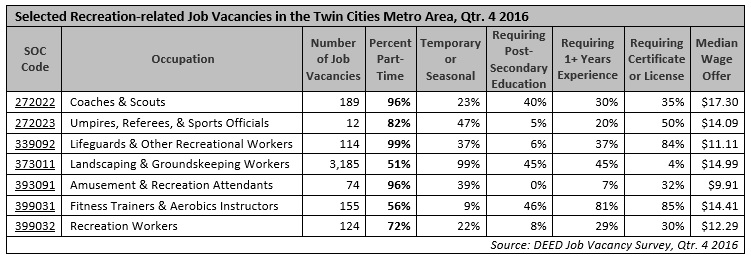 The Minneapolis-St. Paul metropolitan area is a national leader in finance, advanced manufacturing, agriculture and retailing.
The Minneapolis-St. Paul metropolitan area is a national leader in finance, advanced manufacturing, agriculture and retailing.
Medical devices, electronics and processed foods are strong suits recognized globally.
Want the freshest data delivered by email? Subscribe to our regional newsletters.
4/26/2017 12:23:55 PM
Tim O'Neill
Spring is in the air! As we move into May, not only are temperatures warming up, but spring sports are in full swing. What’s more, the Twin Cities boasts an extensive park system, with numerous intramural and club sports. For example, Minneapolis offers everything from sand volleyball and softball in the spring, to soccer in the summer, football in the fall, and pond hockey in the winter. Depending on your interests and location, there should be an opportunity for you to play competitive sports in the Twin Cities.
With spring sports teeing off, hiring for seasonal and part-time positions is also in full swing. Swimming instructors, lifeguards, coaches, assistant coaches, and other positions are open for job seekers. Seasonal equipment operators, park maintenance workers, shop attendants, and other related positions are also hiring.
Taking a deeper dive into coaching, there are approximately 2,000 such jobs in the Twin Cities, with a median annual wage of $36,649. Vacancies for this occupation typically hit around 200 every summer in the Twin Cities region, with 189 coaching vacancies during the fourth quarter of 2016. Of these 189 vacancies, nearly all were for part-time work, the majority did not require extensive education or experience, and the median wage offer was $17.30 (see Table).

If coaching at the college or professional level, a bachelor’s degree is preferred for candidates. While this degree can be in almost anything, most aspiring coaches choose to study exercise and sports science, physiology, kinesiology, nutrition and fitness, physical education, or sports medicine. At the high school level, coaches are typically current teachers or administrators, but qualified coaches may be found from outside of the school. At any level of coaching, whether it’s for a local club, high school, college, or university, candidates must demonstrate excellent communication, interpersonal, leadership, and decision-making skills. One should also consider irregular work schedules when coaching, including evenings, weekends, and holidays. If coaching at the local or high school levels, other part-time work may be needed to cover living expenses.
Employment within Coaching and Scouting is projected to grow by 6.0 percent through 2024. This is equivalent to approximately 175 new positions. Beyond this, however, there will be nearly 1,000 replacement openings, to cover for those who retire or leave the occupation. With rising participation in local, high school, and college sports, considering this occupation should be a must for sports enthusiasts. Check out DEED’s Career and Education Explorer Tool for more information and current job postings for coaches and scouts.
To discover more on coaching and other recreational employment in the Twin Cities, contact Tim O’Neill at 651-259-7401 or timothy.oneill@state.mn.us.